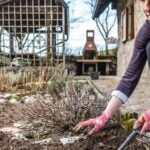Are pill bugs bad for vegetable gardens? Pill bugs, also known as sowbugs or woodlice, are small terrestrial crustaceans that are often found in garden soil. There are common misconceptions about the impact of pill bugs on vegetable gardens, with some believing that they can be harmful to crops. In this article, we will explore the role of pill bugs in the ecosystem, their potential impact on vegetables, and methods for managing their population in vegetable gardens.
Pill bugs play a beneficial role in the soil by aiding in decomposition and nutrient cycling. As they feed on organic matter, they help break down dead plant material and enrich the soil with essential nutrients. However, their feeding habits can also lead to damage in vegetable gardens, particularly to certain susceptible crops. Understanding the signs of pill bug damage and effective management strategies is crucial for maintaining a healthy vegetable garden.
In the following sections, we will delve into the potential impact of pill bugs on vegetables, explore natural and safe methods for controlling their population, and discuss the importance of biodiversity in vegetable gardens. By weighing the pros and cons of having pill bugs in the garden and debunking myths about their harmful effects on crops, we aim to provide a comprehensive understanding of their role in the garden ecosystem.
The Role of Pill Bugs in the Ecosystem
Pill bugs, also known as roly-polies or woodlice, are small crustaceans that play a crucial role in the ecosystem, particularly in soil health and nutrient cycling. Despite common misconceptions, these tiny creatures are not harmful to vegetable gardens and actually offer several benefits to the overall garden ecosystem.
Here are some important points to consider about the role of pill bugs in the ecosystem:
- The beneficial role of pill bugs in the soil: Pill bugs are detritivores, which means they primarily feed on decaying organic matter. As they consume dead plant material and other organic debris, pill bugs aid in breaking down this material and returning essential nutrients to the soil.
- How pill bugs aid in decomposition and nutrient cycling: By facilitating the decomposition process, pill bugs help release important nutrients back into the soil. This nutrient cycling is vital for maintaining healthy soil structure and fertility, ultimately benefiting vegetable plants by providing them with essential minerals for growth.
Overall, it is evident that pill bugs serve as valuable contributors to the garden ecosystem. While they may occasionally nibble on tender vegetation, their role in supporting soil health and nutrient cycling far outweighs any potential minor damage they may cause to vegetable plants.
When considering whether or not pill bugs are bad for vegetable gardens, it’s important to recognize their positive impact on the overall health of the garden ecosystem. By embracing a more holistic approach to pest management and acknowledging the value of biodiversity within the garden, we can appreciate the beneficial role that pill bugs play in maintaining a healthy and sustainable vegetable garden environment.
Potential Impact on Vegetables
Vegetables Susceptible to Pill Bug Damage
Certain vegetables are more susceptible to pill bug damage than others. Leafy greens, such as lettuce and spinach, as well as root vegetables like carrots and potatoes, are particularly vulnerable to feeding by pill bugs. These pests can also target fruits such as strawberries and tomatoes. Understanding which vegetables are at higher risk can help gardeners be proactive in managing pill bug infestations.
Feeding Habits of Pill Bugs
Pill bugs feed on decaying plant material, but they can also consume living plant tissue in the absence of decaying matter. They typically prefer to feed during the night, making it challenging for gardeners to detect their presence. Their feeding habits can result in unsightly holes in leaves and damaged or rotting fruits and vegetables.
Signs of Pill Bug Damage
The most obvious sign of pill bug damage is the presence of irregular holes in leaves and soft fruits. In severe cases, entire sections of young plants may be consumed by large populations of pill bugs. To determine if pill bugs are responsible for the visible damage, inspect plants at night with a flashlight when these pests are most active.
Overall, while pill bugs may not pose a significant threat to mature vegetable plants, they can have a detrimental impact on young seedlings and emerging shoots. As such, it’s important for gardeners to recognize the signs of pill bug damage in order to implement appropriate management strategies before it becomes a major issue.
Managing Pill Bugs in Vegetable Gardens
Pill bugs, also known as woodlice or roly-polies, are a common sight in many gardens. While they are often considered beneficial due to their role in breaking down organic matter and improving soil quality, they can also be a nuisance for vegetable gardeners. These small crustaceans feed on decaying plant material, but they have been known to damage young seedlings and soft fruits in vegetable gardens.
Vegetables that are most susceptible to pill bug damage include lettuce, cabbage, potatoes, and strawberries. Pill bugs feed by chewing small holes in the leaves and stems of these plants, which can stunt growth and reduce overall yield. Common signs of pill bug damage in vegetable gardens include irregular-shaped holes in leaves, particularly around the edges.
There are several natural ways to control pill bug populations in vegetable gardens without resorting to chemical pesticides. One effective method is to reduce moisture levels in the garden, as pill bugs thrive in damp conditions. Watering early in the day and providing good drainage can help deter these pests. Additionally, creating barriers such as diatomaceous earth or copper tape around vulnerable plants can prevent pill bugs from reaching them.
| Method | Effectiveness |
|---|---|
| Reducing moisture levels | Highly effective |
| Barriers (e.g. diatomaceous earth) | Moderately effective |
| Companion planting (e.g. garlic or chives) | Varies by plant type |
By implementing these strategies and staying informed about the impact of pill bugs on vegetable gardens, gardeners can strike a balance that supports both their crops and the surrounding ecosystem.
Are Pill Bugs Actually Bad for Vegetable Gardens?
Many gardeners believe that pill bugs are harmful pests that can wreak havoc on their vegetable gardens. However, the reality is that these small crustaceans actually play a beneficial role in the garden ecosystem. Here, we will explore whether or not pill bugs are actually bad for vegetable gardens and debunk some common misconceptions about their impact.
### Debunking Myths About Pill Bugs in Vegetable Gardens.
Common misconceptions about pill bugs in vegetable gardens:
- They are harmful pests that feed on and damage vegetable plants.
- Their presence indicates a problem in the garden and should be immediately eradicated.
In truth, while pill bugs may occasionally nibble on tender seedlings and decaying plant matter, they primarily feed on decomposing organic material in the soil. This means that they are not actively harming healthy, established vegetable plants. Additionally, their presence can indicate a healthy, well-balanced ecosystem in the garden.
### Scientific Research on the Impact of Pill Bugs on Vegetable Crops.
Research has shown that while pill bugs may cause minor damage to certain vegetables under specific conditions, their overall impact on vegetable crops is minimal. Studies have found that pill bug feeding activity is often concentrated on already damaged or decaying plant material rather than healthy plants. As a result, their presence may actually aid in the breakdown of organic matter and nutrient cycling within the soil, benefiting the overall health of the garden.
### Weighing the Pros and Cons of Having Pill Bugs in the Garden.
When considering whether pill bugs are bad for vegetable gardens, it’s important to weigh both the potential drawbacks and benefits of their presence. While they may cause limited damage to some vegetables, their role in decomposition and nutrient cycling can contribute to a healthier garden ecosystem. It’s essential for gardeners to approach pest management with a sustainable and holistic mindset, considering how different organisms contribute to overall biodiversity and balance in the garden.
Alternative Pest Management Strategies
Pill bugs, also known as roly-polies or woodlice, are commonly found in gardens and are often mistaken for pests. However, they actually play a beneficial role in the ecosystem. Pill bugs aid in decomposition and nutrient cycling by breaking down organic matter in the soil. This process helps to improve soil quality and overall plant health.
While pill bugs have their place in the ecosystem, they can sometimes cause damage to certain vegetables in the garden. They are particularly attracted to crops such as lettuce, strawberries, and cabbage. Pill bugs feed on decaying plant material, but they may also nibble on young seedlings and soft vegetables. Signs of pill bug damage include irregular holes or notches on leaves and moist areas where the pests congregate.
There are natural ways to control pill bug populations without causing harm to other beneficial organisms in the garden. One effective method is to reduce excess moisture in the garden, as pill bugs thrive in damp environments.
Additionally, creating barriers using materials like diatomaceous earth or copper tape can help protect vulnerable plants from pill bug damage. It’s important to consider these natural pest management strategies before resorting to chemical pesticides that can be harmful to both humans and the environment.
| Benefits of Pill Bugs | Damage Caused by Pill Bugs |
|---|---|
| Aid in decomposition and nutrient cycling | Attraction to lettuce, strawberries, and cabbage |
| Improves soil quality and plant health | Feeding on young seedlings and soft vegetables |
The Importance of Biodiversity in Vegetable Gardens
Beneficial Insects for Vegetable Crops
In a vegetable garden, maintaining biodiversity is essential for the health and productivity of the crops. While pill bugs may have a reputation for causing damage, it’s important to recognize that they are just one small part of a larger ecosystem.
By encouraging the presence of beneficial insects such as ladybugs, lacewings, and predatory beetles, gardeners can naturally regulate pill bug populations while also warding off other harmful pests. These beneficial insects play a critical role in controlling pest populations and promoting overall plant health.
The Role of Pollinators
Additionally, attracting a diverse range of pollinators to the garden is crucial for ensuring successful fruit set in many vegetable crops. Bees, butterflies, and other pollinating insects help transfer pollen from one flower to another, allowing plants to produce fruits and seeds.
Without this process, many vegetables would not be able to reproduce and yield bountiful harvests. Therefore, creating an environment that supports pollinator habitats-such as planting flowering herbs and native wildflowers-can significantly enhance the overall biodiversity within the vegetable garden.
Maintaining Balance for Garden Health
By fostering diversity within the garden ecosystem, gardeners can create a natural balance that benefits both plant growth and pest management. When there is an abundance of different species present in the garden, it creates a more resilient environment where no one pest or disease can take over.
This reduces the likelihood of widespread damage to vegetable crops and promotes a healthy and sustainable gardening approach. Embracing biodiversity not only supports plant health but also contributes to a more vibrant and thriving ecosystem within the vegetable garden.
Conclusion
In conclusion, pill bugs are often misunderstood creatures in the realm of vegetable gardening. While they may be commonly perceived as harmful pests, they actually play a vital role in the ecosystem of the garden. Their contribution to soil health, decomposition, and nutrient cycling cannot be overlooked. However, it is important for gardeners to be aware of their potential impact on certain vegetables and take proactive steps to manage their populations.
When considering the question “are pill bugs bad for vegetable gardens,” it is essential to weigh the pros and cons. Scientific research has shown that while pill bugs can cause damage to certain crops, their overall impact on vegetable gardens may not be as detrimental as once thought. By debunking myths and understanding their behavior, gardeners can develop effective strategies for managing pill bug populations without resorting to harmful chemicals.
As with any aspect of gardening, taking a holistic and sustainable approach to pest management is crucial. Integrating natural control methods, such as attracting beneficial insects and companion planting, can help keep pill bug populations in check while maintaining a balanced ecosystem in the vegetable garden. Ultimately, fostering biodiversity and embracing environmentally friendly practices will contribute to the overall health and productivity of the garden.
Frequently Asked Questions
Do Pill Bugs Eat Vegetable Plants?
Pill bugs, also known as roly-polys, do feed on decaying plant matter and can occasionally nibble on young, tender vegetable plants. While they may not be the main cause of damage to established plants, it’s important to keep an eye on them in the garden.
How Do I Get Rid of Pill Bugs in My Raised Beds?
To get rid of pill bugs in raised beds, you can start by removing any excess organic debris and mulch that may be providing them with a favorable habitat. You could also try using diatomaceous earth or iron phosphate-based baits as organic control methods.
How Do You Keep Pill Bugs Out of Vegetables?
Keeping pill bugs out of vegetables can be done by creating a barrier around the garden bed with copper tape or mesh to deter them from crawling up into the plants. Additionally, keeping the garden area clean and free from excessive moisture will make it less attractive for pill bugs to thrive.

If you’re looking to get into vegetable gardening, or are just looking for some tips on how to make your current garden better, then you’ve come to the right place! My name is Ethel and I have been gardening for years. In this blog, I’m going to share with you some of my best tips on how to create a successful vegetable garden.





